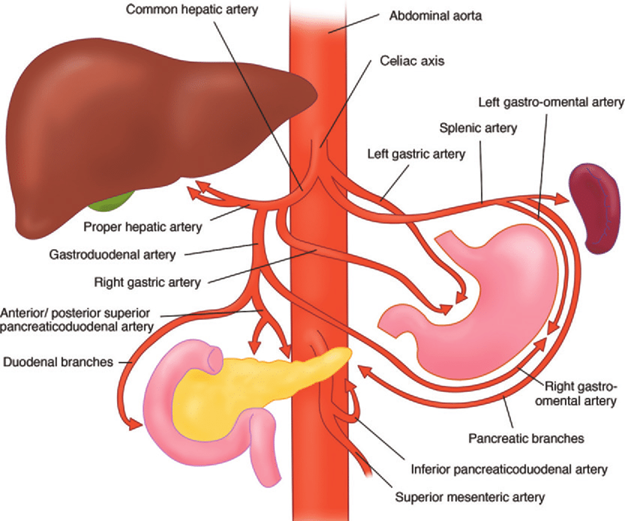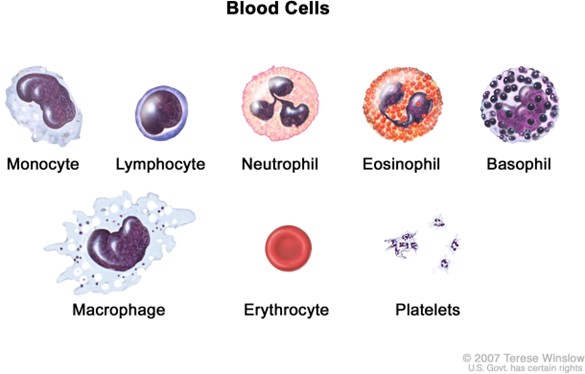The artery that provides blood to both the liver and spleen is the:
Celiac.
Brachiocephalic.
Renal.
Tibial.
The Correct Answer is A
The celiac artery supplies blood to the liver, spleen, and stomach.

It is one of the three major branches of the abdominal aorta, along with the superior mesenteric artery and the inferior mesenteric artery.
The celiac artery divides into three branches: the left gastric artery, the splenic artery, and the common hepatic artery.
Choice B is wrong because the brachiocephalic artery is a large vessel that arises from the aortic arch and supplies blood to the right side of the head and neck and the right arm.
It has no connection to the liver or spleen.
Choice C is wrong because the renal arteries are paired vessels that arise from the abdominal aorta and supply blood to the kidneys.
They are located below the superior mesenteric artery and above the inferior mesenteric artery.
Choice D is wrong because the tibial arteries are branches of the popliteal artery that supply blood to the lower leg and foot.
They are located in the posterior and anterior compartments of the leg.
The normal range of blood pressure in the celiac artery is about 100-120 mmHg systolic and 60-80 mmHg diastolic.
The normal range of blood flow in the celiac artery is about 200-300 ml/min. The normal diameter of the celiac artery is about 5-7 mm.
Nursing Test Bank
Naxlex Comprehensive Predictor Exams
Related Questions
Correct Answer is A
Explanation
A monocyte is a type of white blood cell that is markedly larger than a red blood cell and has a large kidney-shaped nucleus.

Monocytes are involved in defending the body against infectious diseases and foreign materials.
Choice B is wrong because a basophil is a type of granular white blood cell that has a lobed nucleus and stains purple with basic dyes.
Basophils are involved in allergic reactions and inflammation.
Choice C is wrong because a neutrophil is a type of granular white blood cell that has a multilobed nucleus and stains pale pink with neutral dyes.
Neutrophils are involved in phagocytosis and killing bacteria.
Choice D is wrong because an eosinophil is a type of granular white blood cell that has a bilobed nucleus and stains red-orange with acidic dyes.
Eosinophils are involved in combating parasitic infections and allergic responses. The normal ranges of different types of blood cells are:
Red blood cells: 4.5 to 5.9 million per microliter (mcL) for males, 4.1 to 5.1 million per mcL for females
White blood cells: 4,000 to 11,000 per mcL for both males and females
Platelets: 150,000 to 450,000 per mcL for both males and females
Correct Answer is B
Explanation

This is because fibrinogen is a soluble protein in the blood plasma that is converted to insoluble fibrin strands by the enzyme thrombin during blood clotting. Fibrin forms a mesh-like network that traps platelets and other blood cells to form a clot.
Choice A is wrong because thrombin is not converted to prothrombin, but rather prothrombin is converted to thrombin by another enzyme called prothrombinase.
Choice C is wrong because vitamin K is not converted to prothrombin, but rather vitamin K is required for the synthesis of prothrombin and other clotting factors in the liver.
Choice D is wrong because fibrin is not converted to fibrinogen, but rather fibrinogen is converted to fibrin as explained above.
Normal ranges of fibrinogen in the blood are 200 to 400 mg/dL.
Normal ranges of prothrombin time (a measure of how long it takes blood to clot) are 11 to
13.5 seconds.
Whether you are a student looking to ace your exams or a practicing nurse seeking to enhance your expertise , our nursing education contents will empower you with the confidence and competence to make a difference in the lives of patients and become a respected leader in the healthcare field.
Visit Naxlex, invest in your future and unlock endless possibilities with our unparalleled nursing education contents today
Report Wrong Answer on the Current Question
Do you disagree with the answer? If yes, what is your expected answer? Explain.
Kindly be descriptive with the issue you are facing.
